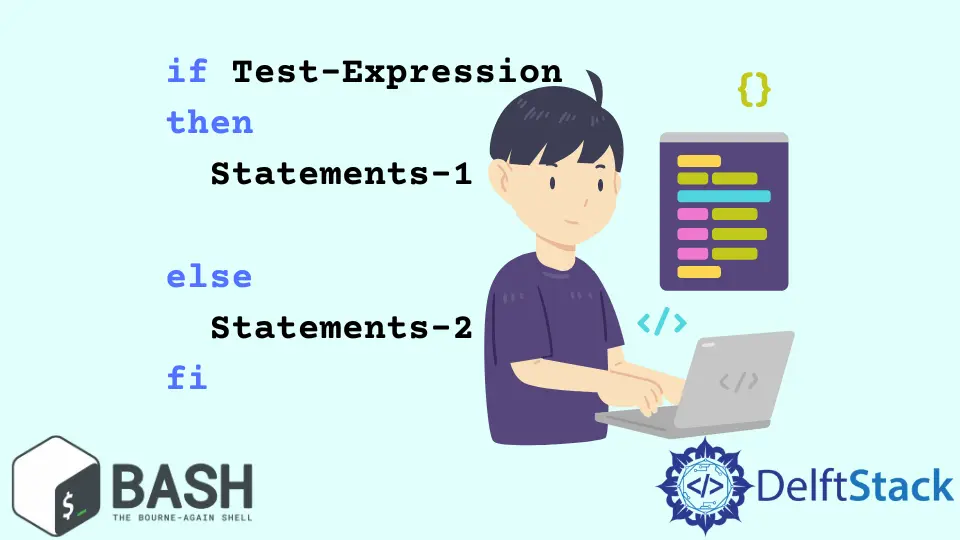How to Use if...else Statement in Bash
-
ifStatement inBash -
if ... elseStatement inBash -
if...elif...elseStatement inBash -
Nested
ifStatement inBash

Conditional statements are prevalent for decision making in almost all of the programming languages. They allow the execution of a statement or statements only if a particular condition is satisfied. if ... else is used as a conditional statement in most programming languages. In Bash we also have if, if...elif...else, if ... else and nested if statements as conditional statements.
if Statement in Bash
Syntax of if Statement
if Test-Expression
then
Statements
fi
In the above example, if the Test-Expression is True, the Statements are executed. fi keyword is used to end the if statement.
If the Test-Expression is not True, none of the Statements gets executed.
To make our code look more readable and organized, we can use either 4-space or 2-space indentation.
Example: if Statement in Bash
echo -n "Enter numnber : "
read n
rem=$(( $n % 2 ))
if [ $rem -eq 0 ]
then
echo "$n is even number"
fi
Output:
Enter numnber : 4
4 is even number
It accepts a number from the user and gives the output only if the number is even number.
If the number is even, the remainder is zero when the number is divided by two. Therefore the test-expression is True so that the echo statement is executed.
if ... else Statement in Bash
Syntax of if ... else Statement
if Test-Expression
then
Statements-1
else
Statements-2
fi
In this example, if the Test-Expression is True, the Statements-1 is executed; otherwise, the Statements-2 is executed. To end the if ... else statement, fi keyword is used.
Example: if...else Statement in Bash
echo -n "Enter numnber : "
read n
rem=$(( $n % 2 ))
if [ $rem -eq 0 ]
then
echo "$n is even number"
else
echo "$n is odd number"
fi
Output:
Enter numnber : 5
4 is odd number
It accepts a number from the user and gives output depending on whether the input number is exactly divisible by 2 or not.
If the number is even, the remainder is zero when the number is divided by two; therefore, the test-expression is True and the statement echo "$n is even number" gets executed.
If the number is odd, the remainder is not zero; therefore, the test-expression is False, and the statement echo "$n is odd number" gets executed.
if...elif...else Statement in Bash
Syntax of if...elif...else Statement
if Test-Expression-1
then
Statements-1
elif Test-Expression-2
then
Statements-2
else
Statements-3
fi
If the Test-Expression-1 is True, the Statements-1 is executed. Otherwise, if the Test-Expression-2 is True, the Statements-2 is executed.
If neither of the test expressions is True, the Statements-3 is executed.
We can have as many elif statements as we wish, and the else statement is optional.
Example: if...elif...else Statement in Bash
echo -n "Enter the value of a: "
read a
echo -n "Enter the value of b: "
read b
if [ $a -lt $b ]
then
echo "a is less than b"
elif [ $a -gt $b ]
then
echo "a is greater than b"
else
echo "a is equal to b"
fi
Output:
Enter the value of a: 4
Enter the value of b: 4
a is equal to b
It accepts two numbers as the user’s input and prints the result based on which of the test-expression is true.
If a<b, the program prints a is less than b.
If a>b, the program prints a is greater then b.
If neither of the conditional statements is true, the program prints a is equal to b.
Nested if Statement in Bash
When an if statement is placed inside another if statement, it is called a nested if statement.
echo -n "Enter numnber : "
read a
rem=$(( $a % 2 ))
if [ $rem -eq 0 ]
then
if [ $a -gt 10 ]
then
echo "$a is even number and greater than 10."
else
echo "$a is even number and less than 10."
fi
else
echo "$a is odd number"
fi
Output:
Enter numnber : 46
46 is even number and greater than 10.
It demonstrates the usage of the nested if statement. If the number is exactly divisible by 2 and greater than 10, echo "$a is even number and greater than 10." statement is executed.
Suraj Joshi is a backend software engineer at Matrice.ai.
LinkedIn